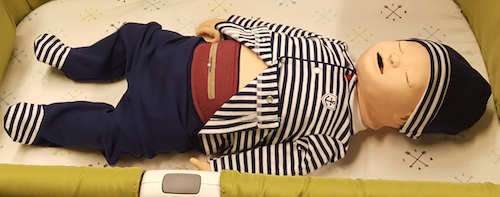Recent advancements in specialized materials and fabrication technologies offer exciting opportunities to realize seamless garments as sensors and actuators for biomedical applications. Knitting fabrication, known as the inter-meshing of yarns into loops (resulting in fabrics), is an ancient form of textile production widely used in the fashion industry. Knitting technology has gained a lot of attention in the field of wearable electronics and has potential to become a widespread method of construction for smart textiles in the future. In particular, Shima Seiki knitting technology enables customization and innovation in the design and fabrication of wearable smart textiles for biomedical sensing and actuation applications. While most electronic textiles in existence today make use of circuits adhesively integrated onto a host garment, our knitting technology enables the creation of garments with seamlessly integrated sensors and actuators. This type of fabric production offers huge savings in terms of manufacturing costs and significantly reduces material waste, enabling new design approaches and innovation in garment and product development.
The Bellyband fabric antenna sensor, shown in Figure 1, is a new creation that DWSL has made in partnership with Profs. Genevieve Dion, Adam Fontecchio, and Timothy Kurzweg at the Shima Seiki Haute Technology Laboratory in the Center for Functional Fabrics. Silver-coated yarn is knitted into an antenna pattern using Shima Seiki industrial knitting machines. When the knitted antenna is stretched, the changes in size, shape, and tension in the fabric cause variation in antenna properties, namely a change in its center frequency. This variation is wirelessly detected using passive UHF RFID.
The passive nature of UHF RFID allows the Bellyband sensor to be used without a dedicated power source such as a battery. The Bellyband sensor has been used in two medical applications:
- Contraction monitoring in pregnant women
- Infant respiration monitoring

In addition to the above listed medical applications, DWSL has also been awarded a grant from National Institutes of Health (NIH) sponsored Cyber-Physical Systems (CPS) initiative. This project will integrate smart fabric sensors and actuators into comfortable garment devices providing unobtrusive prevention options for deep venous thrombosis (DVT), that are not currently possible, particularly in high risk patients. In addition, robust and secure algorithms will process the data from these knit strain sensors, fuse it with other data from the patient’s medical history and medical practitioner inputs, and enable actuated treatment remotely.
The cumbersome nature of current medical equipment makes continuous medical monitoring impractical. We hope to alleviate such issues faced by contemporary medical equipment to allow for low-cost and effective medical monitoring. To develop such a wearable health monitoring system, Drexel University has formed a multi-disciplinary academic team including expertise from industrial and fashion design, materials and electrical engineering, nursing and medicine, as well as management and entrepreneurship. To complement this academic team, we have also formed a three tier industry partnership representing all levels of production and commercialization: Materials Suppliers, Fabricators, and Commercialization partners (augmented by the industrial advisory board of the Drexel Coulter Translational Research program to help determine commercial viability of various biomedical smart textile solutions and carry promising technologies to the market.
Publications
C. Amanatides, S. Hansen, A. S. Levitt, Y. Liu, P. O-Neill, D. Patron, R. Ross, D. Schwartz, J. Stover, M. A. S. Tain, G. Dion, A. K. Fontecchio, V. Pano, W. M. Mongan, K. R. Dandekar, “Wearable Smart Garment Devices for Passive Biomedical Monitoring”, Chapter in Signal Processing in Medicine and Biology, Springer, Switzerland AG, pp. 85-128, 2021. [bibtex][doi]
M. A. S. Tajin, C. E. Amanatides, G. Dion, K. R. Dandekar, “Passive UHF RFID-based Knitted Wearable Compression Sensor”, IEEE Internet of Things Journal, vol. 8, no. 17, pp. 13763-13773, 2021. [bibtex] [doi]
M. A. S. Tajin, W. M. Mongan, K. R. Dandekar, “Passive RFID-Based Diaper Moisture Sensor”, IEEE Sensors Journal, vol. 21, no. 2, pp. 1665-1674, 2021. [bibtex] [doi]
M. A. S. Tajin, A. S. Levitt, Y. Liu, C. E. Amanatides, C. L. Schauer, G. Dion, K. R. Dandekar, “On the Effect of Sweat on Sheet Resistance of Knitted Conductive Yarns in Wearable Antenna Design”, IEEE Antennas and Wireless Propagation Letters, vol. 19, no. 4, pp. 542-546, 2020. [bibtex] [doi]
M. A. S. Tajin, O. Bshara, Y. Liu, A. Levitt, G. Dion, K. R. Dandekar, “Efficiency measurement of the flexible on-body antenna at varying levels of stretch in a reverberation chamber”, IET Microwaves, Antennas Propagation, vol. 14, no. 3, pp. 154-158, 2020. [bibtex] [doi]
R. Ross, W. M. Mongan, P. O’Neill, I. Rasheed, A. Fontecchio, G. Dion, K. R. Dandekar, “An Adaptively Parameterized Algorithm Estimating Respiratory Rate from a Passive Wearable RFID Smart Garment”, In 2021 IEEE 45th Annual Computers, Software, and Applications Conference (COMPSAC), pp. 774-784, 2021. [bibtex] [doi]
M. A. S. Tajin, M. S. Hossain, W. M. Mongan, K. R. Dandekar, “Passive UHF RFID-Based Real-Time Intravenous Fluid Level Sensor”, IEEE Sensors Journal, vol. 24, no. 3, pp. 3863-3873, 2024. [bibtex] [doi]